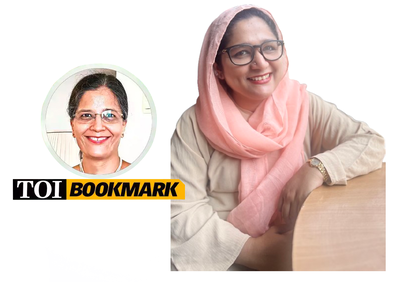ARTICLE AD BOX

Andaleeb Wajid is a hybrid author, having published nearly 50 novels in the past 15 years
Excerpts from the interview:Q. It’s such a moving book. How did you find that space in yourself to write it? A. I really didn’t know whether I would be able to write it. When I started, I wasn’t sure because I don’t usually write non-fiction. And trying to write something so deeply personal wasn’t easy, especially because it took me back to that time.
Most people tend to move away from painful periods in their lives, and that was true for me too. I didn’t want to dwell on it, but at the same time, I felt my grief needed somewhere to go. That’s why I decided to write this book. Q. Could you give us a sense of what the book explores? A. So it's a memoir. And a lot of people, when they hear that, especially without knowing the backstory, find it a little odd because I’m not that old. You’re expected to reach a certain age before reflecting on your life.
But this book reflects on just three months—though while writing, it naturally drew from earlier memories, even childhood. It wasn’t planned. Especially the parts about my father—they simply came, and I let them be.
The memoir, Learning to Make Tea for One, is about the second wave of Covid in 2021. I was hospitalised along with my mother-in-law, while my husband was admitted elsewhere. I survived. They didn’t. It’s been four years.
I consider myself lucky and privileged to have had the chance to heal, thanks to my remaining family. The book makes them relive all of it. I also wrote it to preserve what happened and show who they really were. They had big, unforgettable personalities, and I wanted to honour that. The writing wasn’t cohesive; it took me two years. I wasn’t even sure what the point was at first. But I now feel it did what it needed to. Readers tell me they don’t just empathise with me—they reflect on their own grief.
And that’s something I didn’t expect, but I’m grateful for.
Q. What is in your mind the definition of a memoir? A. I’ve always felt that even when writing fiction, you need to have lived the world a certain amount to write about it. Even with my first novel—you’ve read it—I was writing about what I knew. I had limited exposure, and that naturally led me to a niche no one else was writing about. With memoir, I always thought it was about a life well lived—and I wasn’t sure I’d lived that life.
That was one of my concerns. The idea of a memoir usually brings to mind someone much older, reflecting on a long life. That was my understanding of what a memoir should be. Q. Did you find any particular struggle in writing non-fiction? A. I think with non-fiction, it’s mostly about applying research to a topic and making it interesting for the reader—and I find that quite boring. I really enjoy writing fiction, so non-fiction isn’t something I usually like to approach. But this was different because I put so much of myself into it.
That made it very difficult to write. When I write fiction, I do include parts of myself, but they’re small. This book took huge chunks of me. It was meant to be healing, but at the time, it didn’t feel that way. I’ve only read it during the final round of edits—I haven’t gone back since. Maybe in a few months, I’ll be able to look at it with new eyes. What’s interesting is that when I write fiction—this might sound fanciful—I often feel like there’s an external hand guiding me.
I’ll return to the work months later and be surprised, thinking, ‘I don’t remember writing this—but it’s good.’ I’m hoping I’ll feel that way about the memoir too—that my hand was guided by those who are no longer here. Q. Despite experiencing that pain and revisiting those months, you were able to write about the past. Do you think being a storyteller helped you find clarity or distance in the midst of that emotional chaos? A. I also think it was a very difficult book for my editor, Sudeshna, to edit. You can’t just say “fix this” or “change that” when it’s something deeply personal. Most of the edits were about clarifying things or fleshing out certain parts.
But I could tell it was hard for her too, because, as I mentioned earlier, everyone approaches this book very subjectively. I’m happy it has served its purpose for readers. In the early days after my mother-in-law and husband passed away, people—not my immediate family, but visitors—reacted as though a terrible disaster had struck. And while that compassion was genuine, at times it felt tinged with pity, as if they wondered how I’d go on. Of course, my life has changed, but many things remain the same—I still write, I attend lit fests, I hope to win more awards. This book was a way for me to tell people what really happened, how it unfolded, and how I survived it. That survival is partly because of who I am, but also a reflection of my privilege—which I fully acknowledge. I had my mother, my brothers, my sister, my children. They held me up. Writing this book was a way to put it all down—not to be done with it, but to turn what I was carrying into something shared. Q. And that was during the pandemic, a time of collective grief all around us. So it wasn’t an ordinary moment. Do you think that made the experience of writing and sharing this story even more complex? A. I'm completely aware of that. I knew people who went through similar losses—at least two members gone from a single family. It wasn’t unique to me. But I felt I was able to articulate my grief, and I should—for those who can’t. I don’t mean that in a lofty way, but that’s the response I’ve received from readers. Some said it helped them contextualise their own grief. I understand what you’re saying about people offering condolences.
I think if I had to visit someone, I’d just sit with them, give them space to grieve. In my case, not many people came at the time because we were still under lockdown. We didn’t have the usual deluge of visitors. Those who did come later—some of their reactions felt odd. Of course, what happened was terrible, and I know they meant well, but some responses made me want to withdraw even more.
That’s why the four months and ten days of iddat felt like a pause from real life.
I wasn’t expected to meet people, which I appreciated. The repetition—of telling the story, being asked what happened, or even being questioned, “Shouldn’t you have been more careful?”—I didn’t have to face that as much. That period, from the end of April onwards, was the most painful time of my life. I wouldn’t wish it on anyone.Q. One can take it in stride and say, “Oh, this was the pandemic, it was happening everywhere—so what?” But when it happens to you, it is unique. There’s a hard stop to that relationship, forever. A. I think what happens is that many of us—even I’m guilty of it—don’t fully grasp something until it happens to us.
You think, “Thank God it didn’t happen to me.” You don’t say it, but it’s there. And that’s human—you don’t want to be touched by that kind of grief. But at the end of the day, I’m the one alone with my grief. Even though it’s part of a larger statistic—one among thousands who died—it still feels deeply personal, unfair, and unreal. Sometimes, I find it hard to believe we’ve lived four years without them. Q. The conflict around how men are allowed to move on, start fresh, and live their lives, while women are expected to take each day as it comes and simply keep surviving—do you think this still shapes how we experience grief and recovery A. This thought has been with me long before Covid.
I used to joke with my husband: “If something happens to me, your family will get you remarried.” And he’d joke back, asking, “How do you know?” I’d say, “Because that’s what families do. They think men can’t survive alone.” And during COVID, I saw that play out. So many husbands passed away—and I don’t think any of the widows have remarried, or even considered it. It made me think about how easily society decides to replace women, how replaceable we seem.
Listening to one woman talk about this really ruined my evening. I came home and felt incredibly low. Most days I’m okay—I’ve stopped crying all the time. But that day, I couldn’t stop. I couldn’t even rationalise it—it just triggered something in me. Those were the things I had to put down in the book. I didn’t think about how my family would react. But those who’ve read it have been appreciative. They said it gave them insight into what I went through, and that has meant a lot to me. Q. What has the impact been on you and your sons, in particular after writing this memoir? A. My family didn’t really know I was writing this book until a few months ago. I didn’t know how to explain it to them. Eventually, I told them it was being released, and when the author copies arrived, they saw it. My aunt read it, and my sons read it just before the launch. Not everyone is emotionally expressive—no one really wants to talk about their feelings. I had shown the manuscript to my brother while writing it. He read half and said he couldn’t continue.
He lives in Malaysia and still hasn’t read the full book. Interestingly, many of my cousins and relatives have read it. It does feel like a bit of an invasion of privacy, but this is what I chose to share with the world, so I can’t complain. It is what it is. I think it’s good that my kids read it. They had a different perspective. My younger son never saw my husband after that day—we were all quarantining with COVID, and he was the only one who wasn’t infected. My brother took him away to keep him safe, and he didn’t see either of them again until the funeral. So as hard as it was, I think it was important for him to read it. There’s so much in the book about who they were—not just about what happened, but about the lives they lived before. I think this is something both my sons will treasure.



.png)
.png)
.png)
















 5 hours ago
4
5 hours ago
4









 English (US) ·
English (US) ·